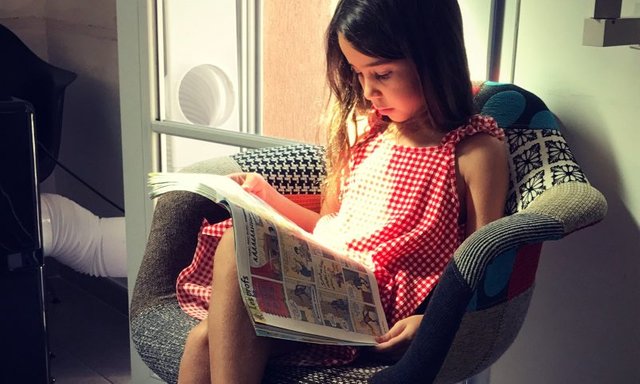Read aloud with teenagers

The moment my children started reading was really magical for me. Observing them as they discovered their ability was surprising. Leonardo, who attended the Steinerian school in which they did not propose reading until the age of seven, had so much desire that he learned by himself.
Learning to read is an irreversible process: you will never be able to look at a series of signs without mentally pronouncing the word they represent. Reading is a big, further step towards autonomy. The child no longer depends on adults to decipher messages that are in the surrounding environment. It is a new competence that strengthens self-esteem and a step towards intellectual freedom.
Now the child - then the boy - chooses his own readings. It seemed very strange to me when they started reading books that I had never read and, perhaps, to advise them.
Living in France, my children don't study many of the great Italian classics that are indispensable for us: they don't read Pirandello, Manzoni, de Amicis, etcetera. As often happens when you don't have experience, I always said that I would offer them these readings in addition to the school curriculum. It's a pity that many of them are not exactly as attractive as Harry Potter in the eyes of a teenager. When I noticed that some of my proposals bore them, I did not want to insist. I am lucky enough to have three children who love reading and I know how harmful it may be to be forced to read things that do not interest them.
Promoting love for reading
I am firmly convinced that reading comic strips with passion and interest is better than reading Pirandello against will. To immerse oneself in reading is an almost meditative experience. This capacity must be fostered in every way possible. And the way, in reality, is only one: to provide the child with the time, space and material (i. e. readings that he considers interesting) necessary.
Leonardo read and re-read his Dragon Ball collection up to nausea before engaging in "The Lord of the Rings". Chiara, who during our trip to the USA read a Harry Potter a week, told me a few days ago that her favorite day is Monday. Strange, I thought, the day most hated by most people. Why Monday? Because it is the day when Mickey Mouse arrives. We are subscribers to the magazine, and in fact the first thing Chiara asks when returning from school to Monday afternoon is "Has it arrived?».
Read aloud with teenagers
But let's return to the topic of this post. When my children learned to read, I thought that the chapter "reading aloud" was definitely closed. Instead, let us continue to practice it. For all those texts that I would like to propose to them but which do not excite them, or for those that seem too demanding for their age but which still have a message that I would like to convey.
When I proposed to Leonardo "The words found" by Tiziano Terzani, he teased me:"I don't want to read Santa's book! We are now reading it together and following it all three with interest. Because it's not just me who read out loud. Sometimes they ask them to be able to read, and we take turns. Other times they want to share a book they have appreciated and ask to read it aloud for us.
Of course, there are also audio books, but it is not the same thing. Reading aloud allows you to stop, ask questions, reflect together, and share moments that will become precious memories. This year Leonardo had to decide which high school he attended and was very attracted by an artistic school far from home, in which he should have stayed from Monday to Friday. In the period in which he reflected on his decision, I lived every moment with him "as if he were the last". In the end he opted for a school near home, which means that I still have a few years of shared everyday life ahead of me, and I'm going to enjoy it without letting myself miss it for a moment.
In essence, I think it is counterproductive to force children and young people to read books that do not fascinate them. They already do so at school and we see how tiring it is. Reading it out loud allows us to be together, to discuss issues that might not have arisen in everyday life, and to broaden their culture by proposing texts that they alone would not have dealt with.